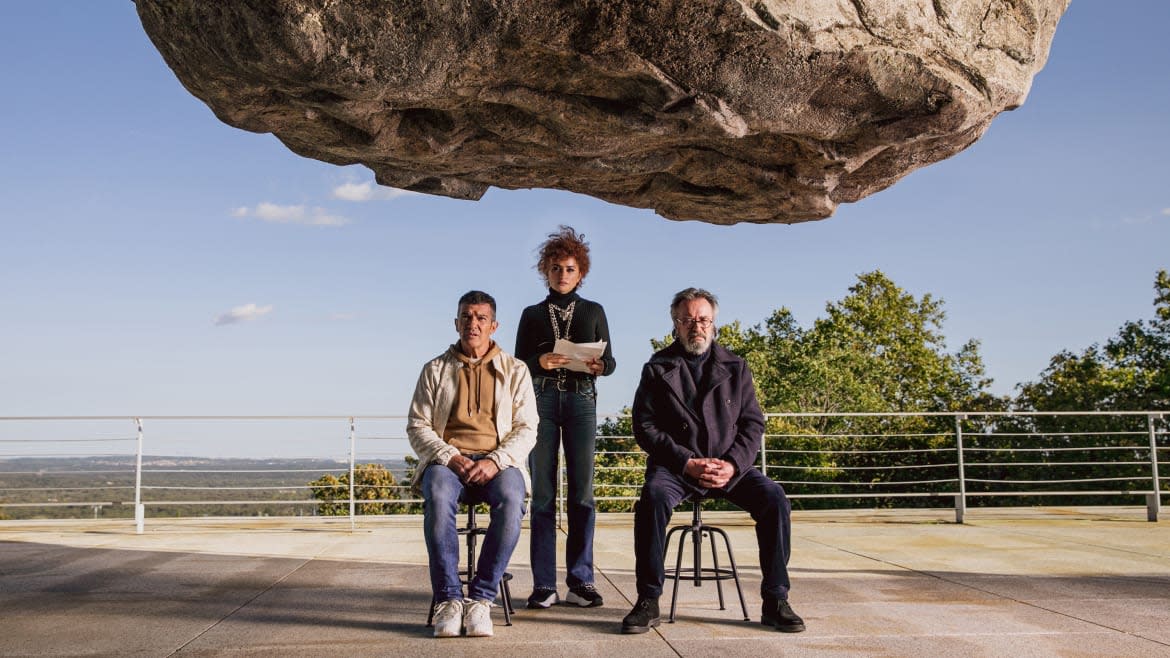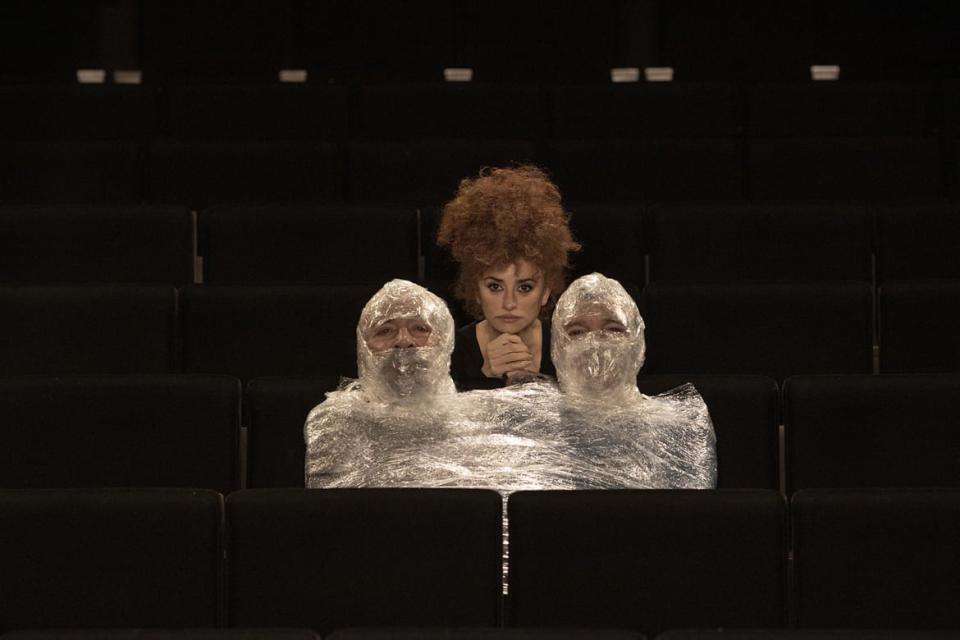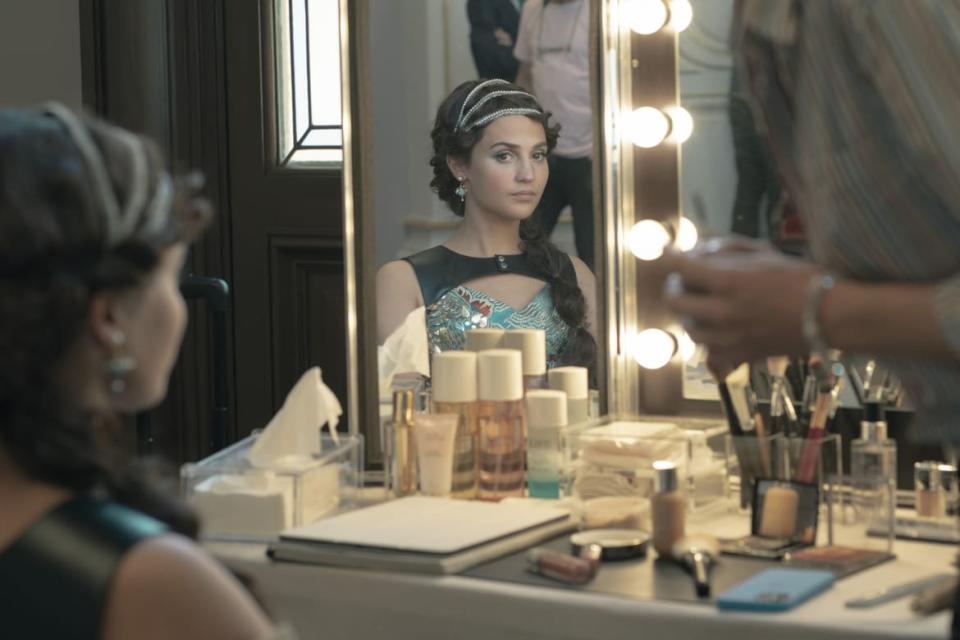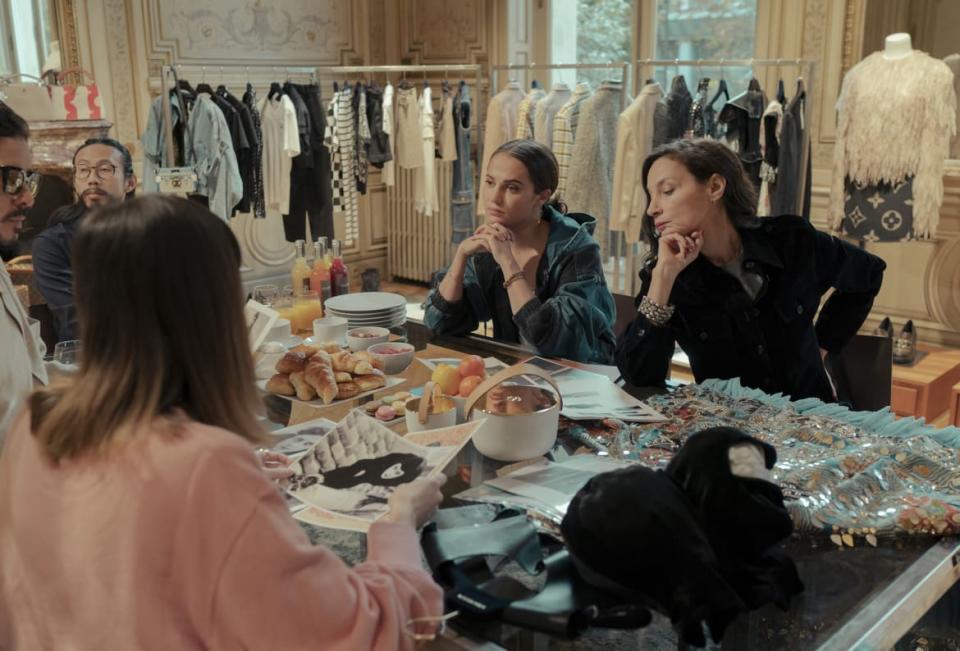Hollywood Is Finally Learning to Laugh at How Horrible It Is

- Oops!Something went wrong.Please try again later.
- Oops!Something went wrong.Please try again later.
- Oops!Something went wrong.Please try again later.
- Oops!Something went wrong.Please try again later.
- Oops!Something went wrong.Please try again later.
One of Hollywood’s favorite things to do is wax poetic about how great it is, how people come from faraway lands with nothing but $3 and a suitcase full of dreams to make it as big-time stars on the silver screen.
Industry titans and nepotism babies will take any chance they can get to make films that extoll upon this outdated idea that was never really true in the first place, only occasionally incorporating a hint of the grit of how things really are: cutthroat, degrading, repressive, and all-around toxic. Hollywood has been in need of a true anti-love letter.
This summer, we’ve been gifted with two: Official Competition, the new Spanish-language film from Mariano Cohn and Gastón Duprat, and Irma Vep, the HBO limited series from Olivier Assayas, who has returned to direct a hyper-meta television adaptation of his 1996 film. These two dark comedies have finally roiled Hollywood’s superiority complex by daring to depict all of the ludicrous insanity of big-budget productions with actual—and welcome—bite.
Official Competition finds the egos of Lola (Penélope Cruz), Félix (Antonio Banderas), and Iván (Oscar Martinez) battling one another while rehearsing for the film adaptation of a bestselling novel that a multi-millionaire pharmaceutical magnate is financing. Lola, the film’s director, puts Félix and Iván through increasingly absurd exercises in an attempt to quash their vanity and make her most compelling film yet.
HBO’s ‘Irma Vep’ Isn’t as Sexy or Spellbinding Without Maggie Cheung
Each actor in the film seems to be playing a character loosely based on their real-life personas: Martinez is the esteemed Spanish film star who has rarely vied for accolades or industry recognition; Banderas plays the sexy international film star whose magnetic screen presence sends audiences swooning all over the world; and Cruz is the enchanting artist with fiery wiles and a playful nature that keeps those around her hypnotized at all times.

Oscar Martínez, Penelope Cruz and Antonio Banderas in Mariano Cohn and Gastón Duprat’s Official Competition.
It would seem that the film is never much of a stretch for any of its stars, which is exactly why it’s such an effective and cutting sendup: Cruz, Martinez, and Banderas are all gleeful conduits for their directors’ indictment of the industry as a vacuous space where the only thing more important than the art is the attention it receives.
As Lola, Cruz struts through Official Competition with gold lamé harem pants and an Alma Har’el by way of Bernadette Peters wig that would threaten to consume her at all times if her sense of self-importance wasn’t so grand. Her presence as the director of the film within a film is commanding, exactly as Lola wants it to be. If the air about her wasn’t intimidating, she’d risk those around her questioning her methods and poking holes in the finished results.
When she’s alone, she can shed her eccentricities and be more human and vulnerable, trying and failing in one hilarious cutaway scene to do The Floss in the privacy of her own bedroom. Even the greatest artists fear being out of step with their public.
Similarly exploring the intersection between actors and directors and their relationships with what the public wants is Irma Vep, the eight-part miniseries which adapts the 1996 film that follows a fictional remake of 1915’s Les Vampires. Confused? Me too, often. The series adaptation of Irma Vep is built like that intentionally, crafting layer upon layer of self-reflexive questions.
See if you can follow for a moment: Irma Vep, the 2022 HBO miniseries, stars Alicia Vikander as an uber-famous American actress named Mira, who is cast to play the titular character of Irma Vep in a remake of a remake. In the fictional world of the series, the 1996 Irma Vep is not a film about the making of a film (like it was in real life), but rather a standalone adaptation of Les Vampires.
Alicia Vikander: Hollywood’s Most Wanted
Trust me when I say it’s easier to understand by actually watching the show, which has proven itself a treat in the four of its eight total episodes that have aired thus far.

Alicia Vikander in the HBO series Irma Vep.
The series operates on a grand scale, moving across chic Parisian hotel lobbies and arrondissements in the fall to rural estates and French countryside. It all conveys the feeling of a miniseries that lives and dies by the fact that it’s spreading itself thin in service of our modern demand for content, spending millions to make a paltry few hours of television that will ultimately be forgotten.
As Mira, Vikander wades through the murk of the fictional miniseries’ troubled production with equal grace and confusion, agreeing to the project to escape the flashbulbs of American paparazzi in Paris and jumping at the opportunity to work with one of her favorite directors, René Vidal (Vincent Macaigne).
Vidal himself is on the verge at all times, a tightly wound tornado trying to repress outbursts of artistic rage and violence to avoid getting the series shut down. Add in a crack-addicted supporting actor, a co-lead demanding script rewrites moment to moment on set, and press breathing down their necks, and you’ve got the perfect allegory for the state of modern cinema.
“Cinema” is the key word, because of course Vidal insists that he’s making a film. One film expanded into eight hours. He does not do television. His costume designer, Zoe (Jeanne Balibar), begs to differ in one scene from the third episode. “No, they’re not long movies, they’re content. Industrial entertainment ruled by algorithms.” Edmond, the fictional series’ lead played by Vincent Lacoste, agrees shortly after when he proposes that “[Platforms] need content, so you stretch the content. You adapt to the market. That’s the opposite of art.”
Meanwhile, Irma Vep itself is doing exactly that, remaking a film and stretching what was once ninety minutes into eight whole hours for a major streaming platform. This kind of winking self-awareness would be extremely cloying if it wasn’t done with such intention. Assayas could easily get away with a surface-level dissection of the industry, satisfying people looking for a hint of irony in their viewing experience and equating that to intelligence. Instead, he opts to go deeper.
Irma Vep doesn’t just skewer the current state of the art form, it proves exactly why it can be worthwhile to expand the universes of individual films into longer pieces of content. Assayas isn’t merely rebooting his own work. He’s accessing a rich well of emotion that would have remained untapped if the first film were left to stand alone. He’s also considering the film’s place in history with the new series—critiquing the way the industry has changed in the 26 years since.

Alicia Vikander and Jeanne Balibar.
This isn’t to say that media displaying some form of self-awareness can’t also be fun. Irma Vep and Official Competition are two of the funniest satires of cinema in recent memory, on par with Christopher Guest’s oft-forgotten For Your Consideration, except instead of Jennifer Coolidge falling over the side of an escalator, we get to watch Antonio Banderas hook himself to an ab contraction belt (hot!), Penélope Cruz throwing a Palme d’Or in a trash compactor (riveting!), and Alicia Vikander stumbling her way through an American accent (expected!).
That Official Competition and Irma Vep both are helmed by international directors contributes to the efficacy of their satire. Working largely removed from the confines of Hollywood’s major studios has its benefits, and the ability to competently look at the state of the industry from the outside in order to lampoon it is definitely one of them. The gags in both of these projects often teeter on absurdity but never feel false. Their directors know just how far to take things before pulling the viewer back into reality. These are parodies, yes, but they never feel hollow.
By shirking the idea that Hollywood and the film industry are dreamy, aspirational spaces, Irma Vep and Official Competition run parallel to each other, ushering in a new era of reflective filmmaking that, for once, actually mirrors the industry and all of its warts. Here, Los Angeles is positioned as the sort of place where art goes to die—or at least remains preserved in amber sunshine, looking beautiful from a distance but revealing all of its ugliness if you look too closely.
The need for wish-fulfillment, technicolor musicals and the retconning of Hollywood’s history for dopey love letters are no longer necessary. Bring on Penélope Cruz doing TikTok dances. The public can handle it.
Get the Daily Beast's biggest scoops and scandals delivered right to your inbox. Sign up now.
Stay informed and gain unlimited access to the Daily Beast's unmatched reporting. Subscribe now.

